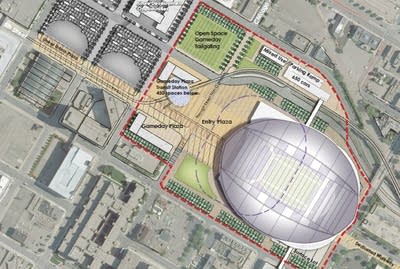Conference committee working stadium deal behind closed doors
Go Deeper.
Create an account or log in to save stories.
Like this?
Thanks for liking this story! We have added it to a list of your favorite stories.

Closed-door negotiations are underway at the State Capitol to try to resolve the differences between the House and Senate on a Vikings stadium bill. The goal is to come up with one final bill that each chamber would vote on in the next day or so.
The private meetings were held in advance of a formal conference committee, which is required to do its work in public. There are several key differences between the two stadium measures, and the clock is quickly running out on the 2012 session.
Both bills would build a new $975 million stadium on the Metrodome site in Minneapolis, and use revenue from charitable gambling and new electronic pull tab games to help pay the state's share of the project.
But each measure emerged from its respective chamber this week with some new wrinkles that don't match up. It's up to six designated lawmakers, three from each body, to figure things out. But none of them was available to talk.
Turn Up Your Support
MPR News helps you turn down the noise and build shared understanding. Turn up your support for this public resource and keep trusted journalism accessible to all.
Rep. John Kriesel, R-Cottage Grove, backed the House stadium bill but was not selected for the conference committee. Kriesel said he was in the dark about the negotiations.
"I don't know where the bill is. I don't know if there are meetings going on," said Kriesel. "I don't know anything right now. It's kind of an interesting situation."
One big difference is in how the gambling revenue would be distributed. In the House bill, it's an even split between charities and the state. But in the Senate, the state would get four times as much as the charities. Kriesel said that's a difference that he's keeping a close eye on.

"I've always been a pretty firm 'yes.' But if it comes out of there really hurting the charities or anything like that, really taking a lot more from the charities than they already are, that would be something that would concern me enough to reconsider my vote," Kriesel said.
The House bill increased the Vikings' share of the stadium by $105 million over what the team had pledged. The Senate wants the team to kick in an extra $25 million. The team's lobbyist objected to both amounts.
GOP Senate Majority Leader Dave Senjem of Rochester said the team contribution is the big challenge for negotiators, and the main reason they've been meeting in private with the Vikings.
"I think they want to respect the business privacy of the Vikings in particular in terms of their relationship with them, their dealing with them on this," said Senjem. "They're going to convene in open air here pretty quickly, I think."
Senjem voted for the Senate bill. Sen. John Marty, DFL-Roseville, a longtime opponent of public subsidies for professional sports facilities, did not.
Marty said he wasn't surprised to learn about the closed-door negotiations. He said he thought the process used to craft the bill was closed from the beginning. Marty said he plans to take a long hard look at the final bill when it returns to the Senate floor.

"We'll be accused of stalling if we try and take time to read through the bill," said Marty. "But that's not our fault that they didn't ask for hearings until after the committee deadlines. They've already broken every rule in the legislative books to grease the skids for this thing. So no, it deserves close scrutiny, and we won't know all that's changed until we see their report apparently."
The House bill includes some backup funding sources if the charitable gambling proceeds fall short. The Senate bill includes some new fees on people who use the stadium. The Senate bill also waives a Minneapolis charter requirement for a public vote on stadium funding. The House bill does not.
Sen. Linda Higgins, DFL-Minneapolis, said she hopes her city's interests are protected in the final bill.
"Since there isn't a Minneapolis person in the conference committee, I don't know what will be coming out. I'm hopeful it is a bill we can support," she said.
The Senate bill provides some long-term assistance to St. Paul to help pay for its sports facilities, and prevents TV blackouts of Vikings games if they're not sold out. It also removes a provision giving the Vikings exclusive rights to bring a major league soccer team to the new stadium.
Those are all items that will have to be reconciled with the House version.





